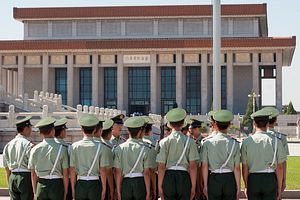As The Diplomat previously noted, in late January the Chinese Communist Party (CCP) officially launched a grand campaign against gang crime by issuing a strongly worded “Notification on carrying out a special struggle to clean up gang crime [literally, ‘black’] and eliminate evil.”
Within weeks, the “struggle” has swept across the country from province to province. The whole legal enforcement system — including the police force, the procuratorates, the ministry of justice, and the judicial branch — and even those outside the legal enforcement system, such as lawyers and the media, have been mobilized to employ the campaign.
On February 5, four top organs of China’s legal enforcement system — the Supreme People’s Court Supreme, the Supreme People’s Procuratorate, the Ministry of Public Security, and the Ministry of Justice — jointly issued an announcement on “strictly cracking down on evil forces’ illegal acts according to law.” In line with the CCP’s notification, the announcement used equally grim wording to urge all criminal elements to turn themselves in before March 1, otherwise they will be “punished severely according to law.”
The announcement also called on criminals’ relatives and friends to “actively persuade” gangsters to turn themselves in. Those who try to hide or shelter criminals will be held accountable, the announcement said.
Particularly, the announcement mentioned that any officials who act as “protective umbrellas” for criminal elements will be resolutely investigated and dealt with according to law. “No matter who is involved, [officials] will be checked thoroughly and [such actions] will never be tolerated.” the announcement emphasized.
Most extraordinarily, the announcement elevated the “struggle” against gang crime to a “people’s war” — a concept developed by Mao Zedong and frequently employed during the Cultural Revolution, but rarely used after that. The announcement further encouraged ordinary citizens to “actively report on” related key problems.
Unsurprisingly, China’s national press has published a series of positive reports on this campaign. For example, People Daily’s overseas version interpreted the announcement as “ the Central Committee’s ultimatum to gangsters.”
While the deadline of this “ultimatum” hasn’t arrived yet, China’s local governments have already initiated the campaign through large-scale arrests.
So far, Shaanxi province has arrested more than 1,400 suspects, busted 202 gangs involved in 532 cases, and seized more than 9.21 million yuan (about $ 1.46 million). Jiangxi province has busted 173 gangs and arrested 1,111 suspects. Zhejiang province claimed that it has just fired “the first shot” against gang crime by arresting more than 1,200 suspects. Shandong province demanded that each procuratorate at the grassroots level should handle at least one case on gang crime this year; otherwise the procuratorate would not pass its annual examination.
Even the All China Lawyers Association (ACLA) — the official national association for China’s lawyers — has established a special committee to guide those lawyers who will provide services to gang crime suspects. According to the Central Committee’s spirit, the ACLA said that all lawyers should “fully understand the great significance of carrying out the special struggle against gang crime” and unify their “thoughts and actions with the policy of the Central Committee.”
At a national meeting on courts on February 5, Guo Shengkun, head of the CCP’s Commission for Political and Legal Affairs — the party organ that oversees China’s legal enforcement system in practice — urged all courts at various levels again to “uphold the absolute leadership” of the CCP.
In light of the campaign’s powerful top-down force and the top authorities’ resolution, it’s highly likely that the so-called “struggle against gang crime” will reach every far-flung corner of the state very soon.

































